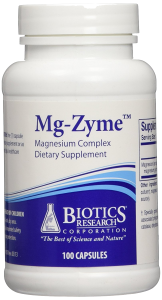Magnesium deficiency is likely an issue for you, as it is for many. Regardless of whether or not you’re eating a high-quality diet and following a flawless stress-free lifestyle.
This is because magnesium-rich foods don’t provide much magnesium. And generally speaking, even the Nutrition Nazi’s are lucky to get 15-20% of the daily requirement – 350-450mg.

In fact 2006 data from NHANES (National Health and Nutrition Examination Survey) found that:
The majority of North Americans did not satisfy the daily requirement for magnesium from food, with females and those over 70 producing the worst results.
And similarly:
A 1995 study found that at least 39% of the population gets less than 70% of the RDA (200mg/day) of magnesium.
Keeping in mind that this is intake is likely far lower today, because of the increase in pesticides, processed foods, and over-farming.

To make matters worse, magnesium is burned up through exercise and during times of stress, and competes with calcium for absorption. Making the need for supplementation even greater.
For instance:
When researchers compared the calcium-to-magnesium ratio in the typical modern diet to that of our hunter gatherers ancestors, the ratio was heavily swayed towards calcium. Looking more like a 5:1 ratio, as opposed to a 1 or 2:1.
The elderly should be extra aware of their magnesium intake, as they tend to:
- Have a lower intake overall
- Absorb less and excrete more
- Take medication that increases depletion
More specifically, blood pressure medication has a significant impact on reducing magnesium levels (1, 2). Which is ironic, considering magnesium is the one mineral that can help prevent heart disease.

Often referred to as the “iron of the plant world” or the “anti-stress mineral,” magnesium helps relax skeletal, blood vessel, and GI tract muscle, lower blood pressure, and overall stress. Many mention less nervousness, anxiety, insomnia, and depression by adding magnesium to their daily regimen, especially when taken before bed.
Dosages in the literature are varied, with 250mg/day proving effective at lowering heart disease risk, 290mg/day helping prevent bone loss in postmenopausal women with osteoporosis, and 100mg/day lowering diabetes risk. Although what is clear, is that:
- The risk of too much is rare, as the kidneys eliminate any excess in urine
- The risk of too little is high, with the minimal amounts in food, and reductions from stress and calcium.

The dosage recommendation of 300-600mg in Live It NOT Diet! are quite conservative compared to the needs of most, and therefore shouldn’t produce diarrhea, cramping, or nausea that can come with heavy doses of magnesium. However, if you experience any of these symptoms, you should obviously cut back on your dosage (no harm, no foul).
You’ll also want to look for a chelated magnesium supplement (ends in ‘ate,’ like magnesium glycinate), as that means it’s blended with an amino acid and better absorbed. My favorite is Mg-Zyme from Biotics because it’s the only one I’ve found with 3 different forms of magnesium – glycinate, aspartate, gluconate.
It’s best taken 30-60 minutes before bed – since it pretty much knocks you out – but if you’re generally a little wired in the evening, you can try splitting the dose to half after dinner and half before bed.
Once you find your optimal dose, don’t be afraid to make adjustments on-the-fly based on your daily stress and activity level.
Stay Lean!
Coach Mike
RELATED ARTICLES:

